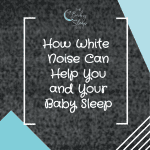
A friend of mine just had a baby and she gave me the idea for this article. Her family was urging her to “get the baby used to sleeping with noise.” If I had a dime every time someone told me part of my son’s sleep problems were because he needed to get used to sleeping with noise… Well, I’d probably only have $5, but still, it was really frustrating to hear! Here’s what I’ve learned in my years of experience helping families with their sleep…
YOU CAN’T GET A BABY TO GET USED TO NOISE AND SLEEP THROUGH IT.
Okay, you might be able to help them not wake up with every little noise, but overall, your baby has a certain hard-wired threshold where certain things will wake him up. Period. Even us adults can be the same way! I cannot sleep through much noise and have used white noise and humidifiers to ease me into a peaceful sleep!
When your baby is a newborn, he will spend most of his time in a deep sleep and may even sleep through almost ANYTHING! In deep sleep, it takes a lot to wake us up (adults included). Around 6 weeks old, he will become more social and start returning your smiles. This might be around the time that noises start becoming interesting. He may not be able to sleep through as much, but usually, he will still be in a deep sleep a lot of the time. By 4 months old, the way he sleeps changes a lot regarding when he goes into a deep sleep and he may be even more affected by noise.
Babies will vary as to how many noises interest them or wake them up and how quickly they can fall back to sleep if they do hear a noise.
Both my boys could not sleep through much noise at all and were not portable babies. (I could not count on them falling asleep on the go). But, my second son could fall back to sleep MUCH easier than my first. You might think I didn’t make enough noise with them, but let me assure you, I did! My first son was in a very noisy daycare for 8+ months. (This was before we got a nanny and kept him home, partially due to his sleep issues). He NEVER “got used” to noise! He simply has always been worried he will miss something fun if he has to sleep! And he all but went on a nap strike at daycare many times.
Even as a 3-year-old, at bedtime, he would claim he was not tired, say he didn’t want to go to sleep, and then fall asleep 4 minutes later. (I am not exaggerating!) He was no different as a baby and would fight sleep tooth and nail. 🙂
With both of my boys, we made sure we put the barking dogs away and gave them a quiet place to sleep. The nursery was calm and quiet. We later bought White Noise Machines, to block out some of the household noises and encourage longer naps and better night sleep. Another friend’s baby was able to sleep through a lot more noise and on-the-go compared to my boys. It’s often just luck of the draw!
So, the next time someone tells you to get baby used to sleeping with noise, don’t walk on your tiptoes! But please do try some white noise, and give your baby a quiet place to sleep if he needs it. I can tell you one thing, I certainly can’t sleep with dogs barking outside my door or the radio blaring. I don’t expect my babies to, either.








